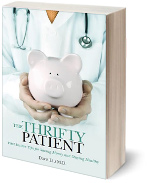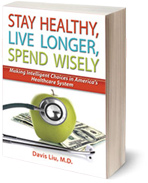Do I Need a Primary Care Doctor? The Quarterback of Your Medical Team.
Assembling the right medical team is important to keeping you healthy and saving money. Besides you, one of the most important people on this team is your regular doctor. For many people, this is their primary care physician (PCP) or primary medical doctor (PMD). A highly trained and well-qualified primary care doctor can advise you on what preventive tests and treatments are truly necessary to stay healthy.
If you view your primary care doctor as a person to simply get referrals from to get better care, think again.
One health insurance plan focused on having patients see primary care doctors first to help them figure out how to proceed. Without primary care doctors helping patients, 60 percent of the time patients chose the wrong specialist. Selecting the wrong doctor wasn’t the only issue. On average, $1,500 was spent on various tests and diagnostic services visits over an eleven-month period before patients were told that the specialist could not help them. Result? Wasted time and money. By pairing patients with primary care doctors, the use of specialists fell by 14 percent, emergency room use decreased by 16 percent, prescriptions declined by 11 percent, and patients received the right care. Less time and money wasted.
Because of differences in training, primary care doctors, like family physicians, internists, pediatricians, and obstetricians, are not the same. Family medicine physicians have trained to care for patients as young as newborns and as old as their grandparents. Internists care for adults as well as seniors. Pediatricians, not surprisingly see patients age eighteen and younger. Obstetricians-gynecologists (ob/gyns) often are considered primary care doctors, but, unlike the other three specialties, these doctors also do surgeries such as C-sections, hysterectomies, and bladder lifts or suspension repairs.
The trait that they all share is that an excellent primary care doctor can make a difference between mediocre care and great care. One report found that “adults with a primary care physician rather than a specialist had 33 percent lower cost of care and were 19 percent less likely to die” after controlling for age, gender, and health condition. An excellent primary care doctor can help you stay up-to-date on your immunizations and preventive screening tests, as well as diagnose problems that bother you.
Should your care require more expertise, your primary care doctor can determine which specialist to send you to and coordinate the care among many specialists if needed. Specialists often work in a vacuum, focused exclusively on their field. To ensure that all of them are on the same page, it is helpful to have one person oversee the overall treatment plan to maximize the benefit and minimize duplication of tests and procedures. While you might be that person, wouldn’t it also be nice if you also had someone else help you? It might be your regular doctor, who knows you and sees the whole person rather than a set of specific organs or diseases.
An excellent primary care doctor is your trusted health care advisor.
The challenge is finding a stellar primary care doctor. This could be harder, as fewer medical students are choosing the fields of internal medicine and family medicine due to increasing administrative hassles, decreasing compensation relative to specialists, and high medical school debt. Of those about to complete a three-year internal medicine residency program in 2003, only 27 percent planned to be internists, down sharply from 54 percent in 1998. Those already practicing medicine are leaving for similar reasons. As more baby boomers age and require additional medical care, there will be fewer primary care doctors available despite the increase in demand for their services. It’s expected that in 2020, the nation will need about 147,000 internists, up 38 percent from 106,000, yet the number of doctors in training will be inadequate to close the gap.
So let’s give you a plan to find a great primary care doctor!

 Get important exclusive advice and tips on how to save money while staying healthy.
Get important exclusive advice and tips on how to save money while staying healthy. Learn how to make intelligent choices in America's Healthcare System.
Learn how to make intelligent choices in America's Healthcare System.
I echo your advise completely. As a family medicine , PCP, in a large urban community where my patients have access to many specialist at major medical centers I often find it to be a daily task to help them keep track of the “big picture”. The communication of the specialist sometimes lack the knowledge of my patient’s full medical history. Thank you for your words and I will be passing them on to my patients.
You make a great point that one of the large benefits of having a primary care doctor is that they help you to stay up to date on your immunizations and preventative screening tests. This is a big deal for my family, because this will help my family to avoid problems in the future and give us peace of mind that we are up to date on all of our medical needs. Also, the fact that your primary care doctor can refer you to the best specialists is great because they know which doctors will provide the best care. http://advmednaples.com/features/family-practice-in-naples/
Thanks for pointing out that having a primary care doctor help you figure out your next steps will avoid wasting time and money. My husband has been experiencing stomach pain lately, and I’ve been trying to find the right specialist for him to see. Thanks for pointing out that a primary care physician will help us figure out how to proceed and may be able to recommend a specialist. You probably just saved us from wasting a lot of time and money!
It’s good to know that pairing with a primary care doctor you can receive the right care because you aren’t using the wrong specialists. My brother started feeling bloated more often and is trying to find his first step for care. I will be sure to recommend he find a PCP near him so that he can save time and expenses from trying different specialists before getting a recommendation.